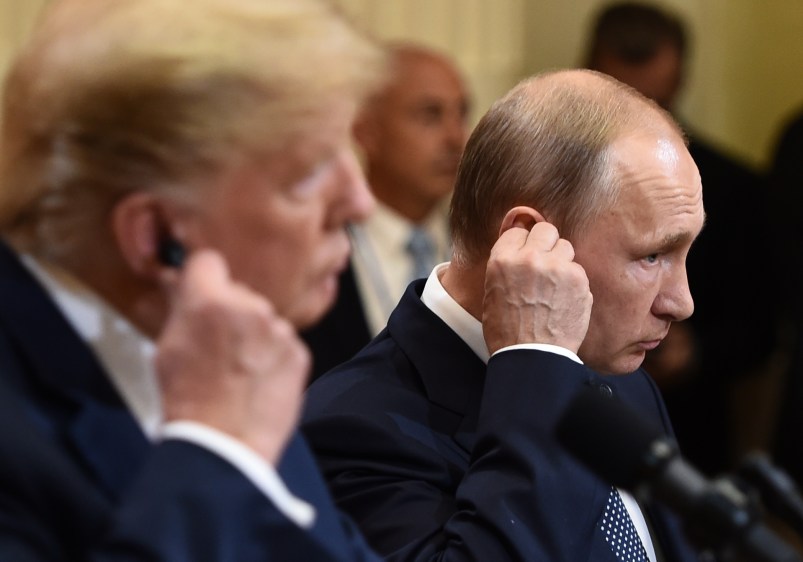WASHINGTON (AP) — After a week of erraticism by President Donald Trump about what really went on in his private meeting with Russia’s Vladimir Putin, history could use a fly on the wall.
There were two — their interpreters. And some Democrats want Trump’s to talk.
One translator’s reaction: What’s Russian for fuhgeddaboudit?
Diplomatic interpreters speak when they’re spoken at, and that’s about it. They are innermost witnesses to international history, but ultradiscreet ones, tasked with reflecting as accurately as possible and in nearly real time the words and context of conversations crossing the language barrier. They otherwise do their best to blend into the drapes.
Diplomatic experts know of no modern precedent for making interpreters come forward. The man who translated for President Ronald Reagan in his historic first meeting with Soviet leader Mikhail Gorbachev in 1985 — alone in the room with them and his Soviet counterpart — thinks it’s a bad idea.
“I have never heard of such a thing and am appalled,” Dimitry Zarechnak, long retired from the State Department, said of the push by Democrats to subpoena the Trump interpreter. “If that were possible, then no foreign leaders would want to meet with any of our leaders.
“It’s either just a gimmick or the animosity has gone up to such a level that they’re not thinking straight about what they’re saying.”
Unconventional ideas are being floated these days, though, to deal with a norms-busting president who is known to describe things the way he wants them to be even when that’s not how they were.
“It is utterly amazing, utterly amazing, that no one knows what was said,” Senate Democratic leader Chuck Schumer said Thursday as Republicans in the House blocked one effort to bring the interpreter to a closed hearing.
After days of Trump’s varied if not contradictory statements about the meeting, the public is no closer to knowing whether Trump called Putin to account for Russia’s interference in the 2016 election or anything else.
The interpreters know, as does Putin.
It’s possible the circle is wider. It’s unclear whether either side recorded the conversation or whether detailed notes are circulating in the Kremlin or across the Trump administration. White House spokeswoman Sarah Huckabee Sanders said she was not aware of a recording of the meeting.
With their eye on the historical record, and the value of having the best thinkers and subject experts at a president’s side, diplomats get the jitters when a president meets one on one with another leader, with only interpreters in the room. Their concern heightens when the leader is an adversary like Putin or North Korea’s Kim Jong Un, both of whom met Trump with interpreters only. Absent corroborating witnesses and a detailed account, misunderstandings and malign interpretations can emerge.
When interpreters are the only extras, they are sometimes called on to help establish a record.
So it was for Zarechnak. He provided what’s known as consecutive translation at the Reagan-Gorbachev summit, alternating with another U.S. interpreter in the series of one-on-one leader meetings.
That means he took notes on Reagan’s remarks and, during a pause, read them to Gorbachev in Russian. The Soviet leader in turn had his remarks translated by his interpreter and read to Reagan in English. This differs from the protocols for simultaneous translation used at bilateral news conferences, U.N. speeches and the like.
It leaves a record — a notebook — and Zarechnak’s became the basis for the official U.S. “memorandum of conversation” that eventually emerged from the meetings. But he wasn’t compelled to disclose it under subpoena and didn’t go around talking about it.
As anyone who has used online language tools knows, word-for-word translation doesn’t cut it. Context, nuances and the rules of languages call for a broader understanding — or interpretation — for smooth communication. And the interpreters used in diplomacy need to know the subject matter to pull it off.
The hazards of inept translation were apparent in President Jimmy Carter’s trip to Soviet-dominated Poland in 1977. Carter spoke of Poland’s aspirations, and the U.S. interpreter rendered the remark as a wish by Carter to have some sort of carnal relations with that country.
The comments were made and translated in public and were later clarified.
For Trump and Putin, it may be that what happened in Helsinki stays in Helsinki.







I completely understand the retired translator’s concerns. Under normal circumstances I would absolutely agree.
But these are not normal days nor normal circumstances nor a normal “president,” so normal procedures may need to be abandoned.
And about the translator’s concern that, if the Helsinki translator would be subpoenaed, "then no foreign leaders would want to meet with any of our leaders, I would rebut this with: again, under normal circumstances with a normal “president.” But they all know that we have a pathological liar on our hands, which is not normal. I suspect, except for those who also have something to hide, the vast majority of today’s world leaders would welcome an on-the-record accounting with this “president”.
The translators were there to help Wibbly-Wobbly understand the LONG words .
You know I’m surprised that they found a translator that could function as a normal translator, but with the bonus of translating Russian, to Standard English, to Trumpianspeak. Because when we talk about being lost in translation that is Trump. I wonder if he has an English to Trump translator at the all his meetings?
Why is it assumed that the often confused, befuddled Trump even remembers totally what was discussed in Helsinki? There may be no reliable record.